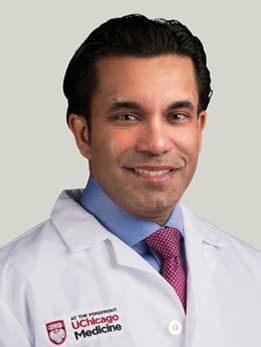Aspirin: Is it more trouble than it's worth?

Many people think taking one aspirin every morning can help prevent a heart attack or stroke. However, studies are questioning this one-size-fits-all approach. Furthermore, a Sandeep Nathan, MD, MS, associate professor of medicine and director of the coronary care unit at the University of Chicago Medicine, offered his thoughts on prescribing aspirin.
According to Nathan, the current approach is popular because that’s where the data previously pointed. However, the new data begs a couple of important questions.
“Number one, does aspirin even work at all? Number two, what is the right dose of aspirin? Number three, does aspirin do what it says it will do in terms of reduction of cardiovascular events within an acceptable safety boundary?” said Nathan.
To answer the first question, yes, aspirin does work. The other two answers, however, are not so cut and dried.
“The proper dosing of aspirin is still to be determined,” said Nathan. “What we do know is that very low doses of aspirin are enough to inhibit the stickiness of blood platelets which we believe is the primary mechanism of benefit from a cardiovascular or cerebrovascular event standpoint.”
Very low doses, meaning 40 to 50 milligrams of aspirin, will help prevent blood platelets from sticking in laboratory experiments. People often refer to this as thinning of the blood to prevent clotting. Nathan notes that the original dosing regimen of aspirin is loosely derived from an antiquated system that dates back more than 1,000 years – so it’s no surprise it’s due for a change.
If 40 or 50 milligrams will probably do the trick, why do we commonly see people popping much larger doses?
“High doses of aspirin are associated with GI irritation and perhaps even bleeding from the stomach whereas low doses may be clinically ineffective,” said Nathan. “So the sweet spot is somewhere in between, but it floats based on a patient’s characteristics and size.”
A high dose of aspirin can be thought of as consuming anything above 325 mg on a daily basis, which again can be risky for patients 65 and older.
“The older you get, the higher your likelihood of cardiovascular events that are in large part, ascribable to blood clotting,” said Nathan. “But at the same time your risk of bleeding goes up.”
According to Nathan, the question of whether aspirin is more trouble than it is worth seems to go back to calculating the proper dose.
“I don’t think aspirin is killing people. We need to recalibrate our risk assessment tools and every patient decision needs to be an individual decision,” said Nathan. “I would discourage anyone from making broad generalizations about aspirin. In the future we will become more finessed in deciding which patients ought to be on aspirin and finding the right dose.”
Aside from taking aspirin, a healthy diet, a reasonable body mass index and cholesterol reduction are some of the easiest ways to avoid heart disease.

Sandeep Nathan, MD
Dr. Sandeep Nathan is a highly skilled cardiologist who specializes in interventional cardiovascular procedures.
Learn more about Dr. Nathan